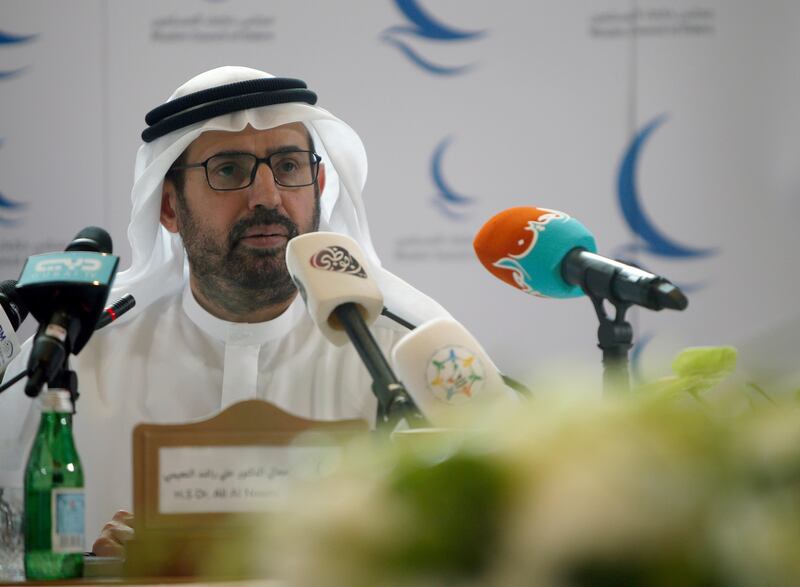The Muslim Council of Elders warned on Monday against regional entities trying to politicise this year’s Hajj.
Dr Ali Al Nuaimi, chairman of the council, said there had been calls for protests during the pilgrimage under the guise of supporting Al Aqsa mosque, which in fact had sectarian motives.
“Hajj is an act of worship that gathers Muslims from all around the world, some want to politicise it and use it for certain agendas,” he said during a council summit in Abu Dhabi.
“Over the past two weeks we heard calls to protest and demonstrate during Hajj, claiming it is to support the Palestinian cause. When in fact these calls have sectarian motives to ruin the hajj season.”
Dr Al Nuaimi was speaking a day after the Saudi foreign minister Adel Al Jubeir said any calls to “internationalise” the management of holy sites in Mecca and Medina was a declaration of war.
_________________
Read more:
Sheikh Mohammed welcomes Muslim Council of Elders - in pictures
Hajj: Saudi Arabia's duty and right
Saudi Arabia says Qatari statements on Hajj are a 'declaration of war'
Qatar crisis: What you need to know
Qatar boycott hits preparations for 2022 World Cup
_________________
Mr Al Jubeir was speaking after a meeting of the four countries boycotting Qatar over its support of extremist groups. His comments came after Qatar’s National Human Rights Commission said Qataris had been told by Hajj authorities they could only enter the kingdom through designated airports, restrictions it termed a “violation of international laws”.
The Qatari foreign minister Mohammed bin Abdulrahman Al Thani said no official from his country had called for the international management of the holy sites. Previous calls have been made by Iran and are highly inflammatory to both Riyadh and Saudi citizens.
Saudi Arabia has said all Qataris who want to perform Hajj and Umrah are welcome.
The Qatari Islamic affairs ministry said on Sunday that Saudi authorities had "refused to communicate regarding securing the pilgrims safety and facilitating their Hajj".
Dr Al Nuaimi said the Hajj warning in the council’s statement is “a completely different issue”, and the talks about internationalising Hajj management are “totally rejected” anyway.
“We don’t want the issue of Al Aqsa mosque to be deployed under other agendas, claiming to be for the support of Al Aqsa and Palestinians,” he added.
“Supporting Al Aqsa is not by demonstrating during Hajj season, but by supporting the durability of the Palestinian people in confronting Zionist terrorism.”
Dr Ahmed Al Haddad, the grand mufti of Dubai, said over the years there have been “known entities”, mostly Iranians, who have been aiming to create tension and chaos during the Hajj season.
“It is impermissible to use Hajj for political reasons, regardless of the source, whether the usual ones or new groups.”
When asked if the statement targets Qatar, he said it is general and it addresses whoever holds such bad intentions.
“Those sources are known, mostly Iranians. Qatar wants to follow their footsteps, but their foreign minister denied the statements were made by one of their politicians and that they don’t want to interfere with the management of Hajj, we hope that they are being truthful,” he added
Hasan Al Shafi, a member of the council, said that attempts to politicise Hajj have been going for 15 years and are not new, and not necessarily exclusive to the Palestinian cause.
Tensions over Qatar and Hajj come nearly two months after Saudi Arabia, the UAE, Bahrain and Egypt boycotted Qatar over its support for extremist groups.
The countries cut off diplomatic, trade and travel links, including Qatar’s one land border with Saudi Arabia.
The four countries that have cut diplomatic and transport ties with Qatar said on Sunday that they have opened up air routes that Qatari planes can use in case of an emergency.
The UAE foreign ministry said that nine corridors were being opened in coordination with the International Civil Aviation Organization, or ICAO.
The emergency routes include overseas areas managed by the UAE and one over the Mediterranean, managed by Egypt.
The boycott has forced Qatar Airways to reroute many of its flights and scrap frequent routes to major regional destinations such as Dubai.






